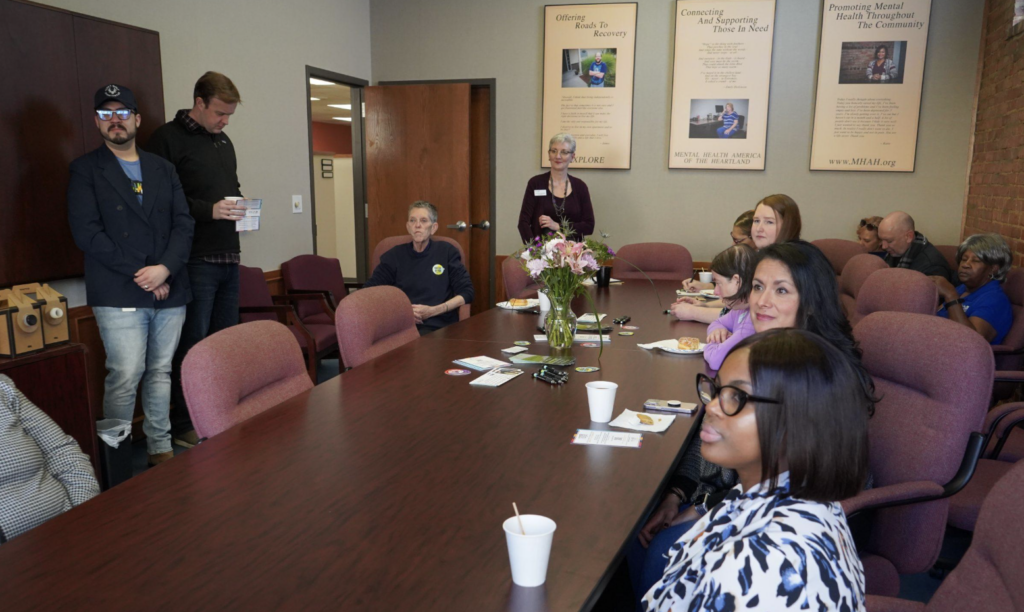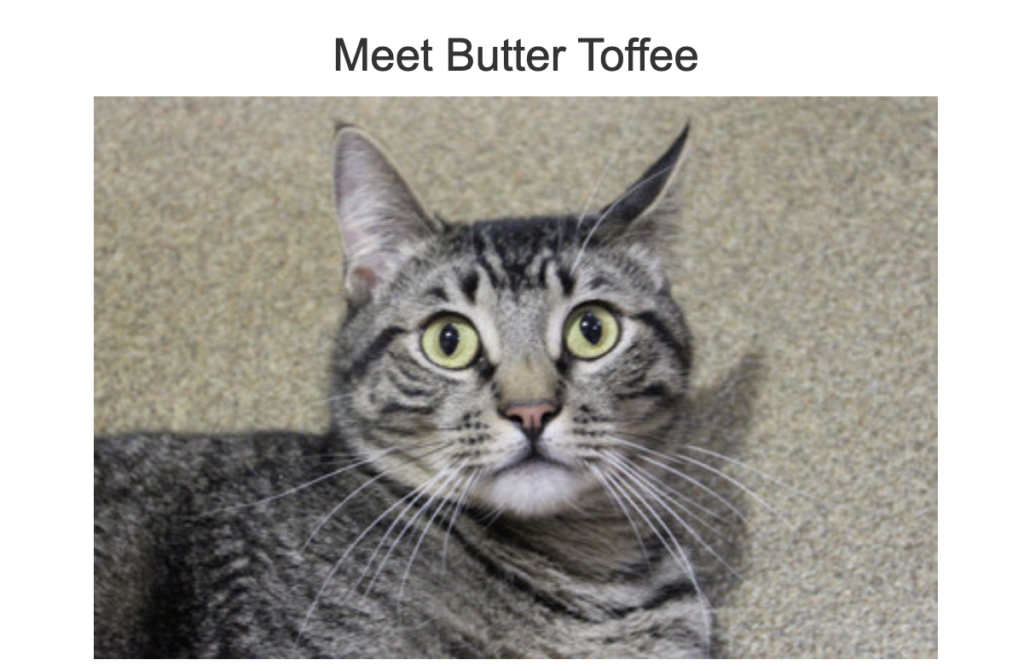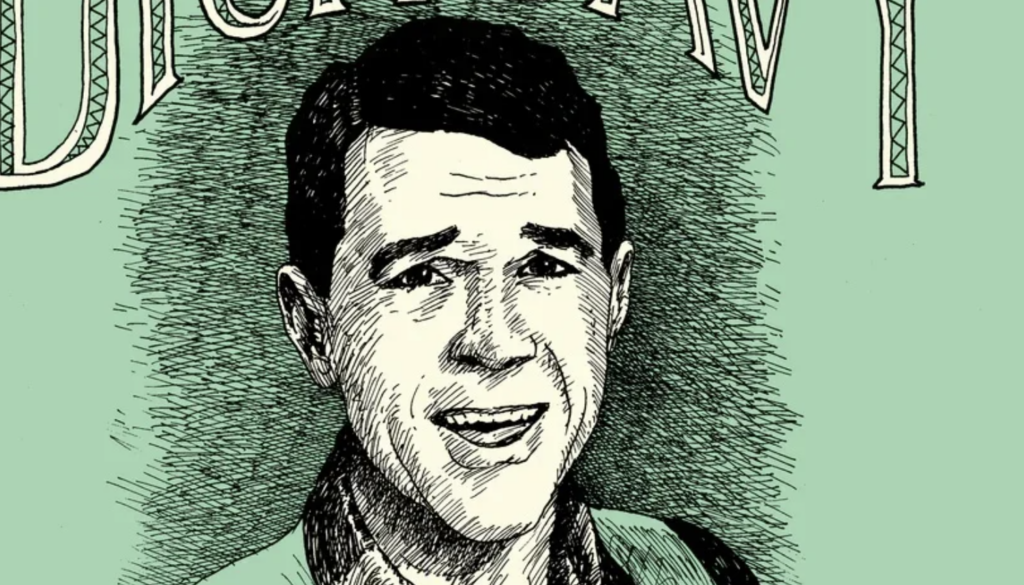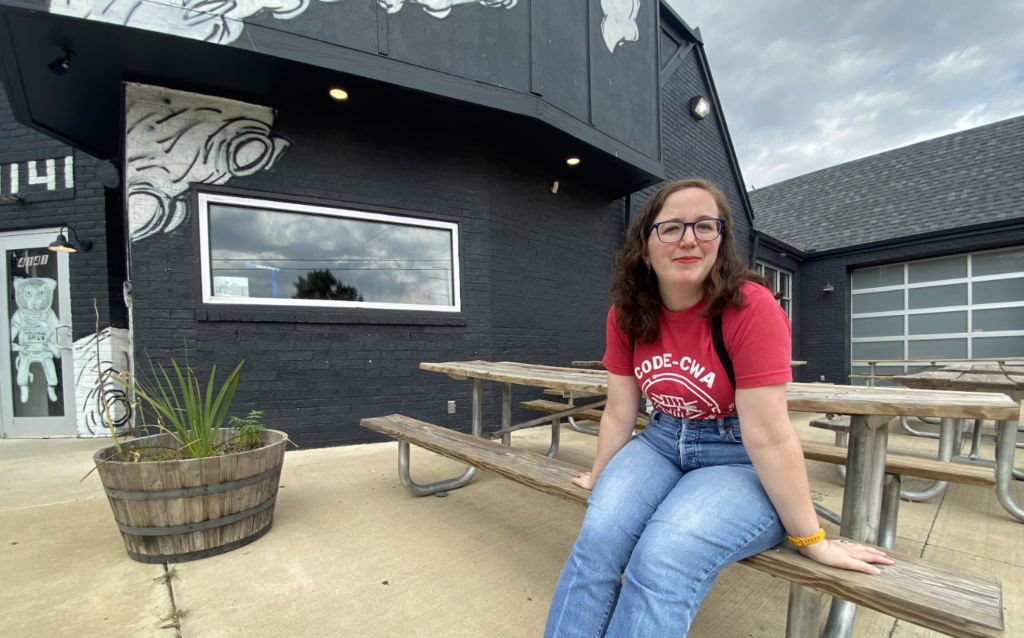Knuck if you Buck: All-Inclusive Show-Me State Rodeo dusts up KC
The sounds of boots clicking, ropes twirling, and horses jawing claim territory in eardrums. The domesticated flock of steers, bulls, and powerful ponies march across chalky brown crumbles, providing strong hints of Western culture into the nasal flow. In the big city, there’s only one place to encounter these Southern sensations: a good old-fashioned rodeo.
Locals eager to reinstate their meridional means and those looking to immerse themselves in the way of life were in luck in mid-May, as the All-Inclusive Show-Me State Rodeo set up shop at Hale Arena for a weekend full of Western tradition.
“Here’s a horse coming in. You feel the wind from it when it spins around, and it turns and goes the other way and you smell the dirt. Then it’s that heat from the dirt. You can smell the livestock, the horses, the dirt, and the wind. There’s all these smells associated with a rodeo that just makes your brain stop being overly active,” Missouri Gay Rodeo Association (MGRA) Rodeo Director Sean Higgins says.
“A rodeo has so many sensations,” MGRA Vice President Shawn Shaffer says. “You have not only the sight of watching it, but you have the sounds of the cattle horns clanking on the metal rails, horses breathing, and the hoof beats as they’re coming down the arena. Then you have those smells that enter into it, so it lights up all of your senses all at once.”
After months of saddling up, between May 10 and 12, MGRA brought some rough and rowdy Western medicine to the city, but with their own type of spin. Carrying all of the known heritage, they added a bit more spunk and glamor to the arena, creating another successful year of LGBTQ+ and physically disabled representation into the mix.
Bucking Beginnings
In 1976, in Reno, Nevada, cowboys and girls gathered for what would be the first gay rodeo. Pioneered by Phil Ragsdale, the rodeo held 125 contestants in search of a safe place to display their passion.
It’s safe to say that it was a hit, as tradition carried on, with numerous states hopping on board the gay rodeo rails. Soon, by 1985, the International Gay Rodeo Association (IGRA) was founded, which then led to Missouri’s first gay rodeo held the following year.
“It was important to create a safe space for our LGBT community to do the things that they love, come together, and keep that lifestyle alive,” Shaffer says.
From the get-go, MGRA faced an incredible amount of obstacles and opposition, having laid the foundation for full representation in the state during the AIDS epidemic. Initially, the rodeo was held at Lone Wolf Ranch Arena in Cleveland, MO, just south of Martin City.
Since the stigmatization surrounding the LGBTQ+ community was still in the minds of many—specifically within Southern and Western communities—it was extremely challenging to formulate these all-encompassing events. To prevent any potential threats, these rodeos were held in secret, secluding an oppressed community from the depths of outraged good ole boys.
“I mean, it was a life-threatening situation to be out as gay in general. But to be out as a gay cowboy was twice as bad because that particular segment of society is very much heterocentric,” Shaffer says.
Nonetheless, the founders of MGRA knew that a safe space for all to enjoy what they know and love was a must. With the help of supporting members in the community, MGRA’s staff brought Southern hospitality to the doorsteps of the Kansas City Metro.
“It gave them a place to do what they loved and to be who they were,” Shaffer says. “They didn’t have to hide who they were to go compete in the rodeos. And I’m gonna tell you, there were a lot of them back in the day that did just that.”
Flash forward to present day, there is still plenty of road ahead, as far as obtaining full LGBTQ+ equality and representation goes. And while society has gained traction in recent years, there is still a formidable presence that lingers in the minds of some of the earliest pioneers of Missouri’s Gay Rodeo.
“The change is hard fought on all fronts, because I won’t lie, even within our ranks, it’s a fight because the older generation grew up with that trauma of, ‘We can’t have it out,’” Shaffer says.
That fear is entirely valid, given the prejudice that the older members of MGRA and IGRA faced. And that hateful push-back isn’t just a thing of the past; there is still a plethora of individuals who ridicule LGBTQ+ culture, with erroneous claims that stereotype the entire community.
“The more we are visible in everyday events that other people participate in will give people the opportunity to see that there is no difference,” Shaffer says. “That we’re not that big, scary, bad, male child molester, which is what everybody wants to go to when they talk about our community. That’s not what any of our community is about, truthfully. And I’m going to tell you, we would be the first ones to turn that sucker in or turn ‘em inside out. One of the two.”
Encompassing Equality
Knocking down barriers is a tradition in the IGRA family. What once started as an undisclosed small gathering of misunderstood and misrepresented individuals looking for a place to hang their cowboy hat has turned into an annual event that involves anyone and everyone from communities all over the nation.
For many members of the IGRA and MGRA coalition, these rodeos offer them a sense of home and peace, making up for lost time on the ranch spent in urban areas.
“Rodeo family’s a legit thing. There’s people I see maybe once a year, but I stay in contact with ‘em and you meet ‘em once, and they’re family after that. We’re real tight knit,” saddle bronc rider from Western Texas Sarah Nickels says.
“I love IGRA. I had a hard time when I came out as queer because I never really felt like I fit in in the city. I couldn’t ever quite find my place. I really never found my place, and I figured I wouldn’t, until I went to my first IGRA rodeo and it felt like I was home for the first time,” Nickels says.
Both Shaffer and Higgins were raised in Southern culture, having been surrounded by livestock, hay bales, and ‘yee haws’ their entire lives.
“Being a part of the rodeo, for me, it’s home,” Higgins says.
“It just felt like I’ve found my place. It’s not a, ‘Oh, these are my people.’ These have always been my people. They just have different types of partners now than they used to,” Shaffer says.
For Higgins and many other participants and staff at Missouri’s All-Inclusive Show-Me State Rodeo, acceptance has always been something direly sought after, and easily found within the gay rodeo community.
“MGRA has actually been very welcoming to me, even for the fact that I’ve been there for 14 years because I personally didn’t look like this when I started going to MGRA. I’m actually a trans man with a disability, and they have actually watched me go through the process and change,” Higgins says.
Higgins’ transition has not been the only aspect of life where he has had to fight for equity and representation. He carries physical disabilities with him as well.
“I was actually supposed to be in a wheelchair by the time I turned 16. Well, I’m 47. So the only downside is I wear braces on both legs, and I’ve had two complete hip replacements,” Higgins says.
That was never a problem in the eyes of MGRA. They accepted, not only Higgins in open arms, but literally anyone with physical disabilities looking to get involved in the rodeo round-up.
“We’ve got a gentleman that competes. He uses a walker to go out and do the goat dressing and stuff with, and he does calf roping on foot. He actually has a walker he has to use because of a degenerative disease he has,” Shaffer says.
Malcolm Cook, just like everyone else involved with MGRA, has a great love for the Southern sport, but has struggled getting involved due to his disability. In an attempt to stay true to their name, IGRA raised money to provide him with a custom walker—a little more durable for the arena foundation than the average tennis balls applied rollators.
With the intention to truly hit all of their marks on being all-inclusive, MGRA has made it known that no single person is barred from participating in their events, regardless of gender orientation, physical abilities, or disabilities.
“We’re not LGBTQ exclusive, we’re an LGBTQ safe space. Obviously it’s gay rodeo, but if you’re straight, you’re welcome to come compete. There’s no barriers there. I’ve had some really cool people show up that just want to hang out and have a good time with all the gays. I think that’s been really good for helping build community there,” Nickels says.
“Whether you’re straight, or you’re gay, it’s all the same thing. The people involved in rodeo here are no different than the people I dealt with in a standard rodeo,” Shaffer says.
Country Cruise
Rolling off their inclusivity efforts, MGRA’s three-day event kicked off with their rodeo school, where they taught inexperienced individuals the ropes of a few of the ‘easy-to-learn’ events.
Anyone can get involved in these camp events with a little bit of time and practice—even if it is just a day before the actual show.
“If somebody wants to come out and learn about it, learn how to do some of the simple things, they’re more than welcome,” Shaffer says.
During this first day, newbies learned from experienced rodeo contestants on the proper ways to participate in the sport.
“It’s not as much about the winning side of things. So you come to school, you learn how to do, say, roping on foot. It’s the experience of getting out there working with these people and everybody supporting you,” Shaffer says.
Encouragement was felt throughout the entire day on Saturday when the full rodeo kicked off, allowing the newcomers to put what they soaked in from the day prior on display, while the skilled vets attempted to awe the crowd.
Beginning with a grand entry and following right into the day-full of competitions, the All-Inclusive Show-Me State Rodeo kicked off just after 10:00 a.m., filled with a day’s worth of hoots and hollers.
The rodeo consisted of 13 events: calf roping on foot, breakaway roping, team roping, pole bending, steer decorating, steer riding, ranch saddle bronc, chute dogging, goat dressing, barrel racing, flag racing, wild drag race, and bull riding.
The All-Inclusive Show-Me State Rodeo is a charitable event, with this year’s proceeds supporting Wishing Well Equine Rescue and Rehabilitation and Kansas City Relay for Life. MGRA also supports AIDS Walk Kansas City throughout the year, and recently reached out to disadvantaged children at Our Spot KC prior to the event, which in turn gained some youth volunteers in this year’s rodeo.
This rodeo is more than just a conglomerate of tough badasses that are brave enough to hop on 1,000+ pound beasts. It is a full portrayal of our evershifting modern society—old and young, gay and straight, city and rural. It truly has it all. From where MGRA and IGRA first began as an underground speakeasy, the All-Inclusive Show-Me State Rodeo’s prominent standing in KC shows the progress of a region coming to understand that a home on the range belongs to all.












